A day after former president Donald Trump won his second Senate impeachment trial, bipartisan support appeared to be growing for an independent September 11-style commission into the deadly insurrection that took place at the US Capitol.
Investigations into the riot were already planned, with Senate hearings scheduled later this month in the Senate Rules Committee. Democrat House Speaker Nancy Pelosi has asked retired Army Lt Gen Russel Honore to lead an immediate review of the Capitol's security process.

Poltiicians from both parties, speaking on Sunday's news shows, signalled that more inquiries were likely. The Senate verdict on Saturday, with its 57-43 majority falling 10 votes short of the two-thirds needed to convict Mr Trump, hardly put to rest the debate about the former president's culpability for the January 6 assault.
"There should be a complete investigation about what happened," said Louisiana senator Bill Cassidy, one of seven Republicans who voted to convict Mr Trump. "What was known, who knew it and when they knew, all that, because that builds the basis so this never happens again."
Mr Cassidy said he was "attempting to hold President Trump accountable," and that as Americans hear all the facts, "more folks will move to where I was". He was censured by his state's party after the vote.
An independent commission along the lines of the one that investigated the September 11 attacks on the US would probably require legislation to create. That would elevate the investigation a step higher, offering a definitive government-backed accounting of events.
Ms Pelosi has expressed support for such a commission while stressing that the members who sit on it would be key. Still, such a panel would pose risks of sharpening partisan divisions or overshadowing President Joe Biden’s legislative agenda.

"There's still more evidence that the American people need and deserve to hear and a 9/11 commission is a way to make sure that we secure the Capitol going forward," said senator Chris Coons, a Biden ally. "And that we lay bare the record of just how responsible and how abjectly violating of his constitutional oath President Trump really was."
House prosecutors who argued for Mr Trump's conviction for inciting the riot said on Sunday that they had proved their case. They also railed against the senate's Republican leader, Mitch McConnell, and others who they said were "trying to have it both ways" in finding the former president not guilty but criticising him at the same time.
Senator Lindsey Graham, a close Trump ally, voted for acquittal but acknowledged that the former president had some culpability for the siege at the Capitol that killed five people, including a police officer, and disrupted legislators' certification of Mr Biden's White House victory. Mr Graham said he looked forward to campaigning with Mr Trump in the 2022 election, when Republicans hope to regain the congressional majority.
“His behavior after the election was over the top,” Mr Graham said. “We need a 9/11 commission to find out what happened and make sure it never happens again.”
The Senate acquitted Mr Trump of a charge of "incitement of insurrection" after House prosecutors laid a case that he was an "inciter in chief" who unleashed a mob by stoking a months-long campaign of spreading debunked conspiracy theories and false violent rhetoric that the 2020 election was stolen from him.
Mr Trump's lawyers countered that Mr Trump's words were not intended to incite the violence and that impeachment was nothing but a witch hunt designed to prevent him from serving in office again.
The conviction tally was the most bipartisan in American history but left Mr Trump to declare victory and signal a political revival while a bitterly divided Republican party bickered over its direction and his place in the party.
The Republican senators who joined Mr Cassidy in voting to convict were Richard Burr of North Carolina, Susan Collins of Maine, Lisa Murkowski of Alaska, Mitt Romney of Utah, Ben Sasse of Nebraska and Pat Toomey of Pennsylvania.
"It's frustrating, but the founders knew what they were doing and so we live with the system that we have," said Democratic senator Stacey Plaskett, a House prosecutor who represents the Virgin Islands, reacting to the verdict.
"We didn’t need more witnesses. We needed more senators with spines.”
Mr McConnell told his fellow Republican senators shortly before the vote that he would vote to acquit Mr Trump. But in a blistering speech after the vote, the senator from Kentucky said the president was "practically and morally responsible for provoking the events of that day" and that the Senate's hands were tied to do anything about it because Mr Trump was out of office.
The Senate, in an earlier vote, had deemed the trial constitutional.
"It was powerful to hear the 57 guilties and then it was puzzling to hear and see Mitch McConnell stand and say 'not guilty' and then, minutes later, stand again and say he was guilty of everything," said Madeleine Dean. a Democratic senator. "History will remember that statement of speaking out of two sides of his mouth."
Ms Dean also backed the idea of an impartial investigative commission “not guided by politics but filled with people who would stand up to the courage of their conviction”.































